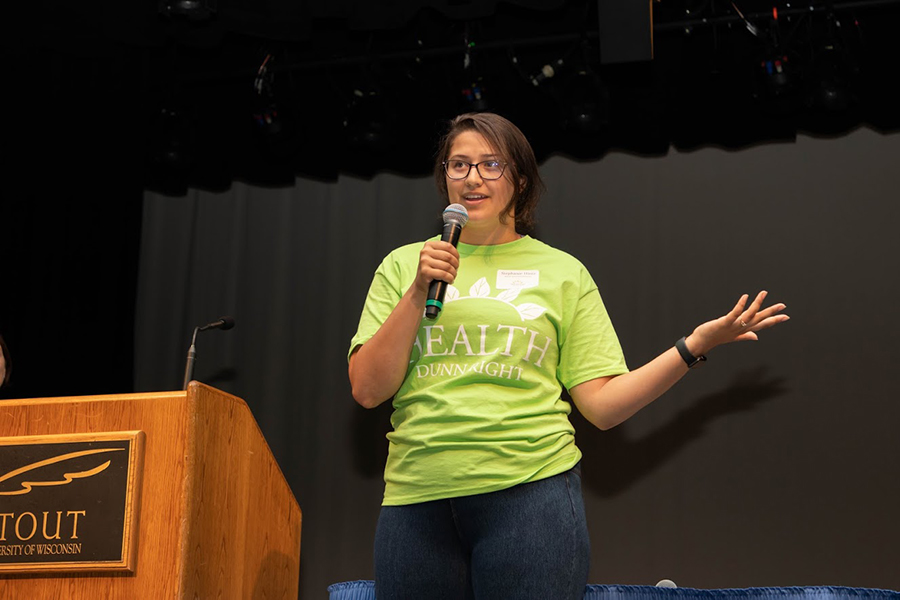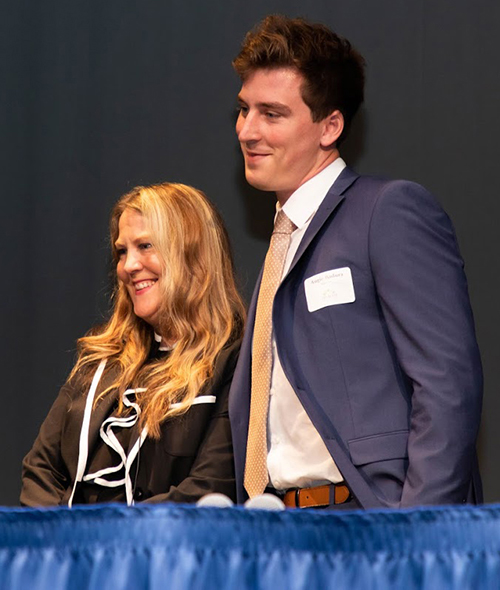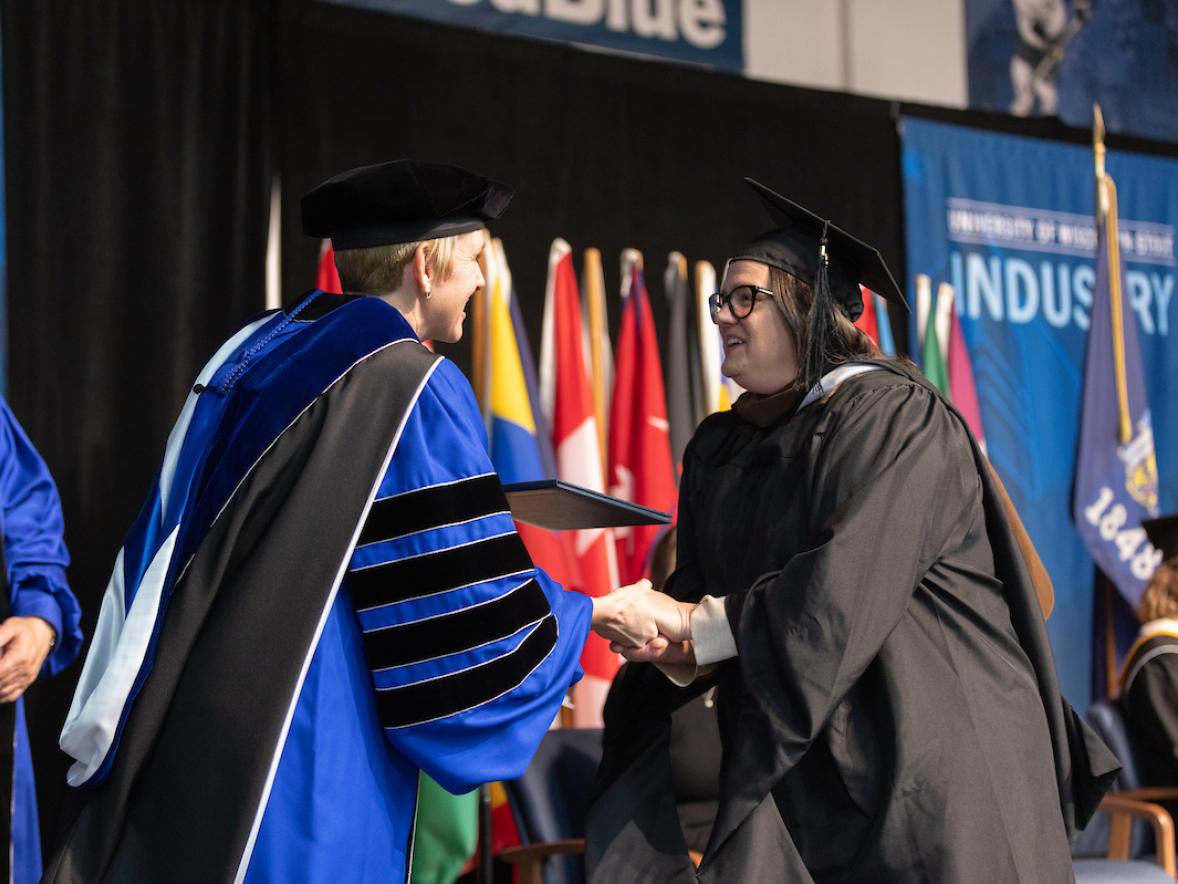Eight out of 10 people surveyed in Dunn County believe there is not adequate access to mental health resources.
That was one of the findings of the 2019 Dunn County Community Health Needs survey unveiled July 16 at University of Wisconsin-Stout during the first Community Health Coalition Conference.
 The coalition, also known as Health Dunn Right, includes the university, Mayo Clinic Health System, Dunn County Health Department and the Community Foundation of Dunn County. Health Dunn Right is supported by the Initiative for the Creation of the UW-Stout Center for the Study and Promotion of Health and Wellbeing.
The coalition, also known as Health Dunn Right, includes the university, Mayo Clinic Health System, Dunn County Health Department and the Community Foundation of Dunn County. Health Dunn Right is supported by the Initiative for the Creation of the UW-Stout Center for the Study and Promotion of Health and Wellbeing.
About 150 Dunn County community members attended the conference, according to Cristy Linse, director of the UW-Stout initiative.
Of the nearly 1,000 residents surveyed, 63% said they or someone close to them were negatively affected by mental health issues. “Finding resources is really difficult for people,” said Dunn County Public Health Director KT Gallagher.
Environmental health is the No. 2 concern in the county, with nearly half of those surveyed saying air, water and food are major or moderate issues in the county. “That’s huge,” Gallagher said. “We are deeply connected to our environment here in Dunn County.”
Sixty percent of the county’s population relies on private wells for water. Concern about the algae blooms on area rivers and streams was raised by those surveyed.
Alcohol and other drug abuse is the third health concern, with 41% saying alcohol abuse negatively impacts them or someone close to them. Sixty percent said not enough resources were available for those with substance abuse issues.
Chronic disease is the fourth leading health concern, with 53% citing access to healthy nutritional resources as an issue.
The final top health concern is access to safe and quality housing. Forty-six percent said it’s a major or moderate concern in Dunn County. About 53 percent of those do not believe the majority of people in the county have access to such housing.
Stephanie Hintz, human development and relationships educator with Extension Dunn County at UW-Madison and a 2015 UW-Stout alumna in applied social science, said residents of different backgrounds and incomes were surveyed for the assessment.
She was pleased to see housing be part of the top needs in the county. “Housing is a problem throughout Dunn County,” she said. During the conference it was noted that apartments can cost $1,000 a month or more, which is expensive for those on a limited or fixed income.

After the community needs assessment was unveiled, teams were set up to address each concern and determine how to make improvements in the county. Those ideas will come together to create a County Health Improvement Plan in September that will be implemented over the next three years.
UW-Stout wants to be part of helping to resolve those concerns, Linse said. “The initiative is to leverage the resources we have on campus for the community,” she noted.
During the conference, one of the keynote speakers was Lauri Badura of Oconomowoc, who talked about drug addiction and its relationship with mental health and her grassroots organization, Saving Others for Archie. She started SOFA in memory of her first son, Archie, 19, who died from a heroin overdose in 2014.
“I am so inspired by this coalition and what you’re doing,” Badura said of Health Dunn Right.
 Drugs, particularly opioids, have killed 700,000 Americans from 1999-2017, she noted. Her son started using marijuana, then started snorting cold tablets and ate a fentanyl patch, his first overdose. His second overdose two weeks later occurred with heroin. The third overdose 77 days later took his life when Archie snorted heroin laced with fentanyl.
Drugs, particularly opioids, have killed 700,000 Americans from 1999-2017, she noted. Her son started using marijuana, then started snorting cold tablets and ate a fentanyl patch, his first overdose. His second overdose two weeks later occurred with heroin. The third overdose 77 days later took his life when Archie snorted heroin laced with fentanyl.
Badura said it is important to talk about overdoses, mental health and to remove the stigma as families fight to save their loved ones from addiction.
“I don’t think there is any easy answer,” she said. “We need long-term recovery. We need sober houses. We need to come together as a community and make a change.”
Keynote speaker Deb Clarke, a leadership and organizational development trainer for Chippewa Valley Technical College, talked on dynamic team building.
The idea for a health center at UW-Stout started about three years ago with Bob Salt, dean of the College of Education, Hospitality, Health and Human Sciences. The center could provide programs, conferences, workshops and other events for those in the health and wellness fields to help continue their learning. Yearly conferences could help the public learn more about health care options, including affordability and availability.
Faculty and students could conduct research and work with the public. An online giving page has been created to help establish the center, which is expected to be self-sustaining through grants and/or private funding.
Those interested in volunteering with Health Dunn Right or being part of a coalition team may contact Linse at linsec@uwstout.edu or 715-232-3285.
UW-Stout is Wisconsin’s Polytechnic University, with a focus on applied learning, collaboration with business and industry, and career outcomes.
###
Photos
Health Dunn Right logo
Stephanie Hintz, human development and relationships educator with Extension Dunn County at UW-Madison and a 2015 UW-Stout alumna in applied social science, helps present the Dunn County Health Needs assessment at the conference.
Lauri Badura, left, and her son August, said communities need to talk about drug overdoses and remove the stigma.






